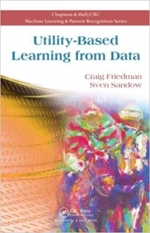Utility-Based Learning from Data (Chapman & Hall/CRC: Machine Learning & Pattern Recognition)

Категория: Other
Поделиться:
Utility-Based Learning from Data provides a pedagogical, self-contained discussion of probability estimation methods via a coherent approach from the viewpoint of a decision maker who acts in an uncertain environment. This approach is motivated by the idea that probabilistic models are usually not learned for their own sake; rather, they are used to make decisions. Specifically, the authors adopt the point of view of a decision maker who
(i) operates in an uncertain environment where the consequences of possible outcomes are explicitly monetized,
(ii) bases his decisions on a probabilistic model, and
(iii) builds and assesses his models accordingly.
These assumptions are naturally expressed in the language of utility theory, which is well known from finance and decision theory. By taking this point of view, the book sheds light on and generalizes some popular statistical learning approaches, connecting ideas from information theory, statistics, and finance. It strikes a balance between rigor and intuition, conveying the main ideas to as wide an audience as possible.
Скачать
Комментарии